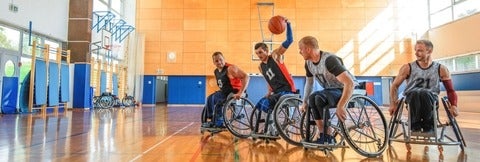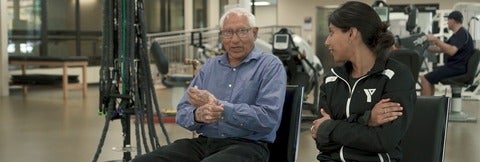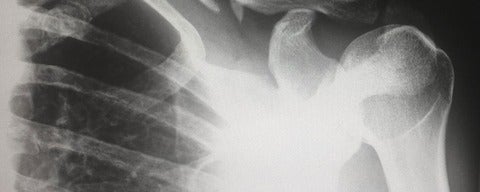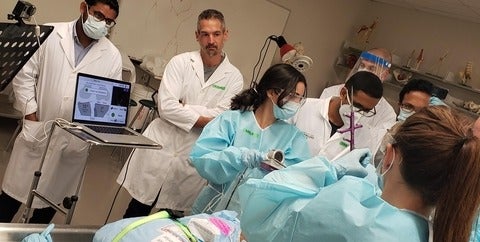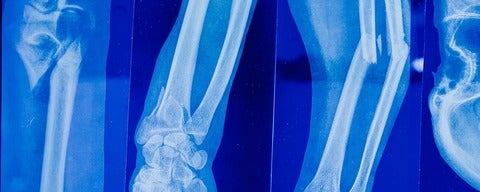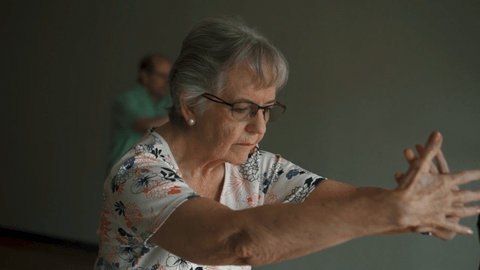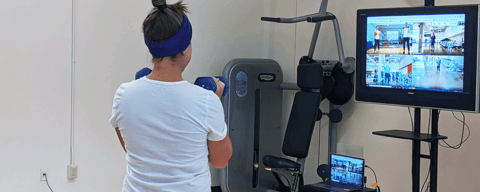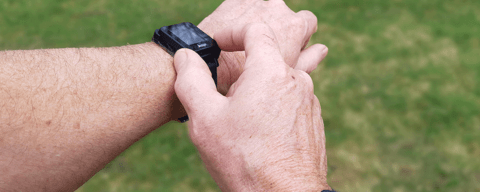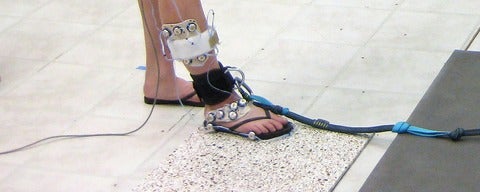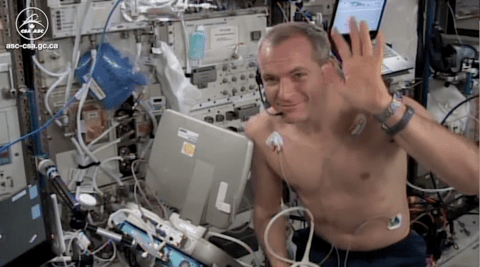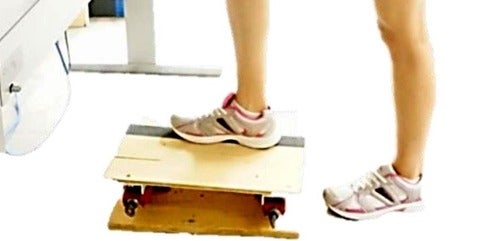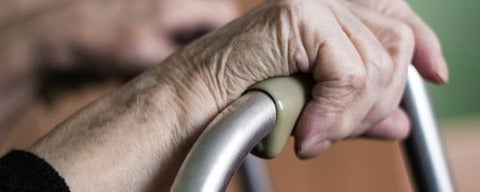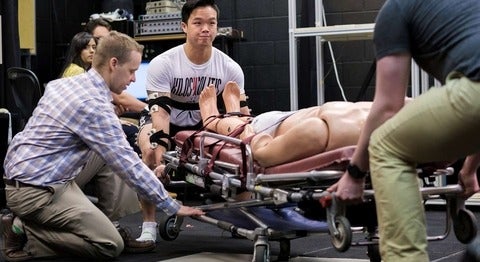Rethinking community life for people living with dementia
Dr. Laura Middleton and the Dementia Capable Communities project team help communities rethink how they plan and deliver everyday services so that people living with dementia are respected, supported and included.
Funding supports new modular biomechanics lab
Dr. Jordan Cannon, an assistant professor in the Department of Kinesiology and Health Sciences, received funding from the Canada Foundation for Innovation to fund a modular biomechanics suite to study joint function and dysfunction in athletes during movement.
Waterloo researchers awarded more than $1 million for dementia research
Faculty of Health study aims to improve the quality of life for people living with dementia in ethno-racial communities
Female pilots perform better under pressure, study finds
New research challenges gender bias in aviation performance using eye-tracking technology and flight simulation
Waterloo researchers awarded more than $4.5 million
Dr. Heather Keller awarded nearly $1M for training and evaluation related to mealtime experiences of people living in long-term care.
Dr. Lora Giangregorio named Canada Research Chair
Kinesiology and Health Sciences Professor Lora Giangregorio has been awarded a Tier 1 Canada Research Chair (CRC) in Bone Health and Exercise Science, with a funding allotment of $1.4 million.
One-third of older Canadians at nutritional risk
New study finds one-third of Canadian adults aged 55 or older are nutritionally at risk, potentially leading to increased hospital stays, more emergency visits and physician consultations for possible infections.
How Paralympic athletes maximize performance on the basketball court
Waterloo sport scientist helps to optimize mobility for national wheelchair basketball athletes.
Is your work chair hurting your back?
A new study finds that dynamic sitting (involving movement in a chair with a rotating seat pan) increases lower spine movement without negatively impacting posture or evoking pain.
A better way to ride a motorcycle
A new study predicts motorcycle riding postures using digital human software, finding that shorter and taller statured individuals are more vulnerable to discomfort.
Dr. Paolo Dominelli receives Early Researcher Award
Kinesiology and Health Sciences associate professor Dr. Paolo Dominelli has received an Early Researcher Award, valued at $100,000.
Dr. Kaylena Ehgoetz Martens receives Canada Research Chair and JELF funding
Dr. Kaylena Ehgoetz Martenshas received both a Canada Research Chair, Tier 2, in Gait and Neurodegeneration, as well a Canada Foundation for Innovation John R. Evans Leaders Fund (JELF) grant.
Dr. Laura Middleton’s DELIGHT project receives $1 million PHAC grant
The grant will allow for evaluating and spreading the impact of the healthy lifestyle program, designed for people living with dementia and their care partners.
Dr. Kaylena Ehgoetz Martens awarded Michael J. Fox Foundation grant
Dr. Kaylena Ehgoetz Martens receives a portion of $1.35 million USD for research in Parkinson’s freezing of gait symptom.
Osteoarthritis researcher receives Canada Foundation for Innovation grant
Kinesiology professor Nikolas Knowles receives a Canada Foundation for Innovation John R. Evans Leaders Fund for his project to help slow or prevent joint deterioration from osteoarthritis.
Researchers explore why some people get motion sick playing VR games while others don’t
A new study, led by researchers at the University of Waterloo, found that the subjective visual vertical – a measure of how individuals perceive the orientation of vertical lines – shifted considerably after participants played a high-intensity VR game.
DREAM resources support the health and wellness of persons living with dementia
The DREAM project has developed a new series of learning modules and resources with an aim to improve how community service providers support and include persons living with dementia in their wellness programs and services, especially those related to physical activity and healthy eating.
New medical imaging technology may transform osteoarthritis assessment
Dr. Nikolas Knowles, a researcher in Kinesiology and Health Sciences, is studying a new imaging technology to assess shoulder osteoarthritis.
New partnership allows medtech startups to train surgeons
The Faculty of Health’s Human Anatomy Laboratory, which is housed in the Department of Kinesiology and Health Sciences, offers the perfect location for surgeons to test procedures on cadaver donors.
Researchers seek new ways to detect bone fragility, prevent fractures
Engineering and Health experts at the University of Waterloo are collaborating on research that may lead to breakthroughs in preventing a serious, all-too-common injury — broken bones.
University of Waterloo led research improves equal access to community supports
A group of researchers from the University of Waterloo is providing community partners with training and resources to support people living with dementia.
Aerobic fitness of elite soccer players linked to player positions
Researchers have linked the fitness of elite soccer players to the positions they play. The ability to make this assessment can help coaches regulate individual training loads based on player position.
CBD might help prime cells against COVID
Synthetic cannabidiol, a non-psychoactive compound also found in the cannabis plant, appears to prime the innate immune system of cells, potentially offering protection against pathogens such as SARS-CoV-2.
Wearable biosensors can help people with complex health conditions
Remote monitoring of health-related behaviour with wearable sensor technology is feasible for people with complex health conditions, shows a recent University of Waterloo study.
New tools and resources available for persons living with dementia
Many things change when a person is diagnosed with dementia, but one thing that doesn’t have to is the ability to exercise.
Q and A with the experts: Cancer and exercise during a pandemic
Marina Mourtzakis, a Kinesiology professor who leads Waterloo’s Centre for Community, Clinical and Applied Research Excellence, examines how to exercise safely as a cancer survivor during or after treatment.
Waterloo researchers lead remote wearable technology program
Persons with neurodegenerative diseases can monitor at home
Are flip-flops more dangerous than bare feet?
Flip-flops have a tendency to come off the foot entirely during slips in dry and wet conditions, contributing to a greater risk of injury, says a University of Waterloo study.
Q and A with the experts: The psychology of the return of major league sports
We talked to sports mental performance consultant Wade Wilson in the Department of Kinesiology to help us understand some of the risks of convening the major leagues to play again.
Study looks at COVID-19 health perceptions in different age groups
The study, conducted by the Brain and Body Lab at the University of Waterloo, is asking people of different age groups how vulnerable they believe they are to COVID-19.
Ergonomics guide helps prevent workplace injuries
If your workspace is not optimized, chances are that you may experience at least one of the following issues: sore shoulders, neck pain, back pain, eye strain, or repetitive wrist strain.
Kinesiology researchers help address healthy aging on The Nature of Things
The human body is a complicated, intertwined network of systems that miraculously allows us to walk, breathe, talk and understand others, normally without any thought as to how we do it.
Puberty responsible for larger airways in males
Sex differences in airway size are not innate, but likely develop because of hormonal changes around puberty, reports a new study.
Storytelling can reduce VR cybersickness
A storyline with emotionally evocative details can reduce virtual reality cybersickness for some people, according to a new study.
Kinesiology researchers work with astronauts to study aging and cardiovascular health
Canadian Space Agency (CSA) astronaut David Saint-Jacques will return to Earth in a few days after more than six months in space.
Low-tech footrest can help prevent lower-back pain
People who stand at work for long periods of time might be able to avoid lower back pain by intermittently using a footrest, says a new study by researchers at the University of Waterloo.
Virtual reality games could recalibrate neurological disorders
Playing games in virtual reality (VR) could be a key tool in treating people with neurological disorders such as autism, schizophrenia and Parkinson’s disease.
Variety necessary to bring anxiety-reducing meditation to university classrooms
The researchers examined whether mindfulness meditation could be used in large classrooms to ease the anxiety first-year university students tend to experience around written assignments.
How to make the pushup work for you
The pushup is a highly adaptable exercise that can be tailored to help individuals with specific needs, say a team of UWaterloo researchers who studied a modified pushup, called a ‘pushup plus.’
Virtual reality motion sickness may be predicted and counteracted
Researchers at the University of Waterloo have made progress toward predicting who is likely to feel sick from virtual reality technology.
"Smart clothing" aims to predict failing health
A team of Waterloo researchers found that applying artificial intelligence to the right combination of data retrieved from wearable technology may detect whether your health is failing.
Standing desks may lead to lower back pain
Nearly half of people who use a standing desk are at risk of developing lower back pain, according to a study at the University of Waterloo.
Aging slows perception of falls
Seniors need twice as long as young adults to realize they are falling, a delay that puts them at increased risk for serious injury, according to a new study from the University of Waterloo.
Powered stretchers could reduce injuries, keep paramedics on the job
University of Waterloo study finds moving from manual to powered stretchers could reduce the number of injuries to paramedics by 78 per cent.
Survey will reduce rates of malnutrition in hospitals
University of Waterloo researchers have created a tool aimed at decreasing the rate of malnutrition in hospitals. Known as the Mealtime Audit Tool (MAT), it will help dietitians, doctors and nurses identify why a third of patients in acute care settings don’t eat the food on their trays.
Kinesiology brings research to life at Ontario Science Centre
Two new studies are part of the Biomechanics: The Machine Inside exhibit, which gives visitors a hands-on look at the marvels of natural engineering that drive human and animal movement.
Omega-3 supplements can prevent childhood asthma
Taking certain omega-3 fatty acid supplements during pregnancy can reduce the risk of childhood asthma by almost one third, according to a new study from the Copenhagen Prospective Studies on Asthma in Childhood (COPSAC) and the University of Waterloo.
What's the secret behind Jordan Kilganon's epic slam dunks?
To uncover just what makes Kilganon such an athletic outlier, Cannon is using state-of-the-art motion capture and electromyography technology to measure muscle activation and joint angles where he suspects they matter the most—not in the legs, but around the spine and hips.







